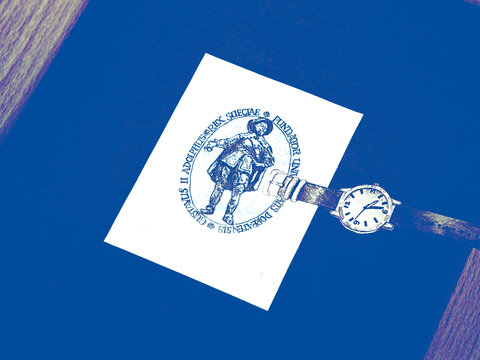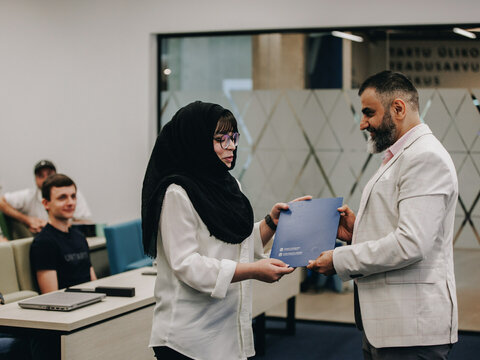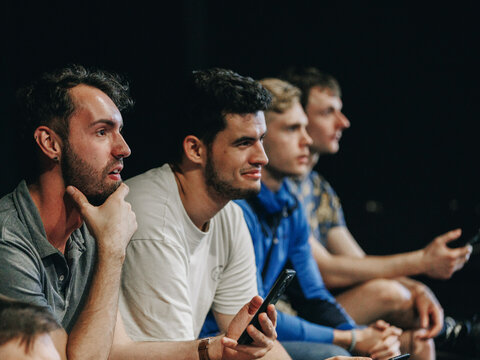Abuse Recognition & Support in Healthcare: A Quick Guide for Physiotherapists
-
Credits
1 ECTS (26 hours)
Form of study
Entirely web-based
Location
Veebis
Fee
free
Teachers
Anastasiia Turusinova
Logan Emily Carmichael
Logan Emily Carmichael
Study group
Inter-disciplinary programmes and qualifications involving health and welfare
Program language
Estonian
Purpose:
The main objective of the course could be formulated as following: - To increase awareness of violence-related issues among physiotherapists and other healthcare professionals
- To increase capacity of healthcare professionals to identify warning signs of abuse
- To increase capacity of healthcare professionals to recognize and address burnout.
This course was developed in the framework of the OPEP-DV Project, an Erasmus+ project launched in February 2022. The goal of the course is to help physiotherapists and other healthcare professionals to identify signs of domestic abuse in their patients. By the end of the course, professionals should be equipped with a set of practical instruments that can be used to provide help to their patients. The course contains different types of weekly assignments that are individually submitted by the course participants.
Target group:
The target groups of this course are physiothrapists and healthcare professionals, students of physiotherapy departments and other healthcare fields.
Outcome:
By the end of this course, students should be able to:1. describe abusive relationships, types of abuse, their signs and forms
2. identify signs and cases of DV/IPV by using screening tools
3. perform risk assessment and safety planning
4. distinguish risk and protective factors for burnout and other professional challenges
By the end of the course, professionals should be equipped with a set of practical instruments that can be used to provide help to their patients.
Starting conditions:
Basic computer skills: ability to write and submit assignments via Moodle form.
All the specific terms are introduced and explained in the first lecture.
Teachers:
Anastasiia Turusinova - Digital Marketing Specialist at the University of Tartu and a course instructor providing technical support and assistance to the course participants.Logan Emily Carmichael - a PhD candidate in the Johan Skytte Institute for Political Studies and a Junior Research Fellow in e-Governance at the University of Tartu.
Content:
| Topic | Credit | Lectors |
|---|---|---|
| 1. Types of violence & its consequences: - introduction of the phenomenon of domestic violence and intimate partner violence - power and control wheel, cycle of abuse and other patterns relevant for abusive relationships - risk factors and types of abuse among children, adults and elderly people - correlation between substance abuse and domestic violence |
6 | Logan Emily Carmichael |
| 2. Identification of victims in physiotherapy settings: - main signs of abuse - available screening tools - responsibilities of a healthcare professional. |
6 | Logan Emily Carmichael |
| 3. How to help: - introducing different risk assessment tools and risk management - referral pathways and other support services - multiagency cooperation. |
6 | Logan Emily Carmichael |
| 4. Fine-tuning your response to victims of violence: - dealing with abuse as a healthcare professional - main challenges when working with victims of violence and how to protect yourself. |
6 | Logan Emily Carmichael |
Price info:
MOOC is free of charge
Location info:
The course is entirely web-based
Learning environment:
Studies and teaching takes place in appropriate classrooms, which have the required teaching equipment and meet the health and safety requirements.
Schedule and further information:
Pre-recorded video lectures, supplemented by independent reading and revision to introduce the content; weekly quizzes and other types of assessment to allow students to assess their understanding of the week's material.The course consists of 4 modules:
* Module 1: introduces the phenomenon of domestic violence, describes types of abuse, their forms and signs
* Module 2: addresses the process of identification of violence and introduces different screening tools.
* Module 3: covers first steps in providing help to the patient - risk assessment and safety planning
* Module 4: addresses different professional challenges that might appear when working with victims of violence - secondary traumatization, burnout etc
The course is designed to be completed entirely on the basis of independent learning. The learning activities are
composed of the following elements:
- Watching video lectures (2 hours)
- Independent work (including readings which include more than 150 pages, recap of the materials before attempting the quiz, preparing for the final exam, etc) (15 hours)
- Pre-course questioner and Quizzes (including work on the case studies and analysis) (5 hours)
- Forum discussion (2 hours)
- Scenario game (1 hours)
- Final exam (1 hour)
The hours have been estimated, referring to Learning Design Toolkit by Akseli Huhtanen, Aalto University.
The assigned instructor is Anastasiia Turusinova (anastasiia.turusinova@ut.ee). All communication (questions, student discussion, etc) is to be done via the Moodle forum or Anastasiia's working email which will be mentioned in Moodle. Any feedback can be sent through the forum.
Requirements to complete:
All quizzes and exams should be completed by the final date of the course. Participants need to get the final grade 71 or higher to pass the course.
Outcome method:
non-differentiated (pass, fail, not present)
Grading method:
The course consists of the following assessment methods:- Quiz (Module I) 10%
- Quiz (Module II) 20%
- Scenario game (Module III) 20%
- Quiz (Module IV) 10%
- Forum discussion (Module IV) 20%
- Final exam - 20%
Grading criteria:
Quiz (Module I) - Multiple choice quiz. Non-differentiated. To pass, a student has to demonstrate the understanding of the topic by providing correct answers to the questions (with a minimum score of 80%). Participants need to get 8 grade or higher to pass the quiz and move on to the next assignment. In case of failure the second attempt is allowed without any penalties. The total weight of the assignment is 10% regarding the final score.
Quiz (Module II) - Multiple choice quiz with an integrated case study. Non-differentiated. To pass, a correct identification of signs of abuse (with a minimum score of 80%) is required. Part of the quiz is a case study, where the situation of the patient is described. Course participants will analyze the case by answering the questions of one of the risk assessment tools.Participants need to get 15 grade or higher to pass the quiz and move on to the next Module. In case of failure the second attempt is allowed without any penalties. The total weight of the assignment is 20% regarding the final score.
Scenario game (Module III) - The scenario game will be implemented either through “Lesson” activity on Moodle or Quiz. The idea is to let participants go through interactive case study of the situation with the patient. Participants will be offered different scenarios on how to react and what to ask. Scenario game will help participants approach rapid risk assessment and first steps of creating a safety plan for their patient. If participant has chosen incorrect reaction or question line, they can retake this step of the scenario game without any penalties. Participants need to get 15 grade or higher to pass the game and move on to the next Module. In case of failure the second attempt is allowed without any penalties. The total weight of the assignment is 20% regarding the final score.
Quiz (Module IV) - Multiple choice quiz. Non-differentiated. To pass, a student has to demonstrate the understanding of the topic by providing correct answers to the questions (with a minimum score of 80%).Participants need to get 8 grade or higher to pass the quiz and move on to the next assignment. In case of failure the second attempt is allowed without any penalties. The total weight of the assignment is 10% regarding the final score.
Forum discussion (Module IV) - Course participants are asked to do a self-assessment test for burnout. In the forum discussion they are invited to share the results (if they want) and describe their helpful practices for burnout prevention. The discussion will be moderated by the course instructor. Every student is expected to contribute with minimum one post in the forum discussion on Moodle. Students will be asked to provide at least two advices on burnout prevention and elaborate on their choice. There is no word limit for this task. Assessment criteria: participation in the discussion and correctness of the provided answers. Answers that are not related to the topic of the discussion will be marked as incorrect and will not be counted. Participants need to get grade 15 or higher to pass the assignment. The total weight of the assignment is 20% regarding the final score.
Final exam - Multiple choice exam with one open answer. Non-differentiated. To pass, a minimum score of 80% is required. Each course participant will get unique set of questions from a pull of questions. The pull contains all the questions from previous quizzes from the course. Thus, the final exam will evaluate how well the course participant remembers the material from all the Modules completed during the course. Participants need to get 10 grade or higher to pass the quiz and complete the course. There is no time limitation to complete the exam. The total weight of the assignment is 20% regarding the final score."
Document to be issued:
Certificate of completion
Registration information:
Thank you for enrolling to the course! The course starts on 29.04.2024. Detailed instructions and login credentials will be sent to you closer to the course opening.
Registration deadline:
07.10.2024
Additional information:
Anastasiia Turusinova, anastasiia.turusinova@ut.ee, +372 +372 737 6579
Program code:
MVSF.TK.069
General contact:
Similar lifelong learning courses
Time of occurrence:
28.11.2024
-
28.11.2024
Credits: 0.25 ECTS (8 hours)
Form of study: Classwork
Language: Estonian
Time of occurrence:
19.09.2024
-
05.06.2025
Credits: 1 ECTS (26 hours)
Form of study: Classwork
Language: Russian





